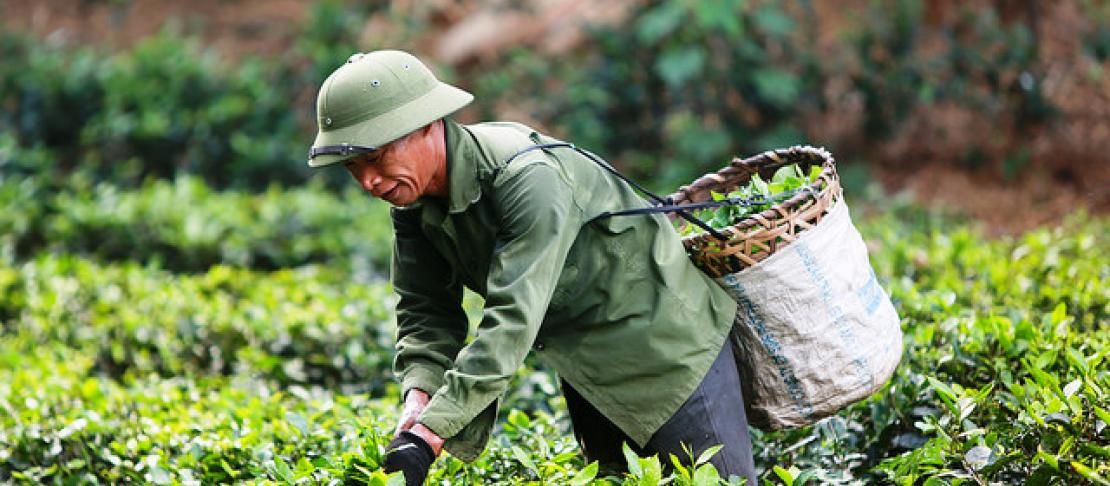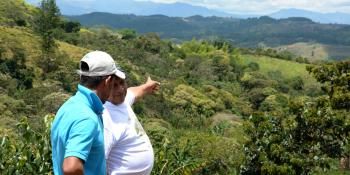Common problems, common solutions: Southeast Asian countries highlight shared approach to climate action in agriculture

The Association of Southeast Asian Nations emerged as a major player at the climate negotiations this year, particularly on agriculture.
Last month’s climate talks in Marrakech put an important spotlight on agriculture, despite stalled negotiations on the topic. The conference also marked the culmination of a major regional cooperation effort on climate change and agriculture, as Southeast Asian countries articulated their common priorities on agriculture within the United Nations Framework Convention on Climate Change (UNFCCC) under the umbrella of the Association of Southeast Asian Nations (ASEAN).
Dr. Margaret Yoovatana, Head of the Multilateral and International Organization Collaborations within Thailand’s Department of Agriculture said: “With the ASEAN Common Position, the ASEAN Ministers of Agriculture and Forestry have sent a clear message that agriculture, comprising crops, livestock, forestry, fisheries and aquaculture, is a top priority for action to address the impacts and drivers of climate change in ASEAN.”
The efforts of the ASEAN countries have been facilitated by the ASEAN Climate Resilience Network (ASEAN CRN), a platform for regional exchange, with technical support from the CGIAR Research Program on Climate Change, Agriculture and Food Security (CCAFS) and the UN Food and Agriculture Organization (FAO). “Countries in South East Asia face many similar challenges in their agriculture sector as a result of climate change,” said Ms Imelda Bacudo, Senior Advisor and Deputy Head of the Forest and Climate Change project under the ASEAN-German Programme on Response to Climate Change, which supports ASEAN CRN. “We have already facilitated several intra-regional efforts to respond to these challenges, but now countries are calling on the international community, particularly the UNFCCC to take cognizance of challenges and support the development and scaling out of solutions,” she explained.
What are the ASEAN priorities for the UNFCCC?
The ASEAN Member States (AMS) identified common priorities in relation to agriculture in the UNFCCC. These include:
1. Agriculture under SBSTA
Issues relating to agriculture have been under discussion in the SBSTA over the past 5 years. AMS want SBSTA to create the evidence base for adaptation actions in the agriculture sector, and to develop models to achieve impacts at scale. For this greater linkages are needed between SBSTA and the finance, technology and capacity building mechanisms of the UNFCCC.
2. Implementation of the Paris Agreement
AMS have identified agriculture as a priority sector for action as the Paris climate agreement is implemented. Priorities identified by AMS in their INDCs include:
AMS have identified agriculture as a priority sector for action as the Paris climate agreement is implemented. Priorities identified by AMS in their INDCs include: strengthening early warning systems and climate information services, improving Disaster Risk Reduction planning and implementation, improving watershed and water resources management, developing agricultural insurance schemes, improved livestock management including disease control, planning and policy measures, and fisheries, aquaculture and coastal management actions. Many of these activities are already being implemented and scaled up in the region, so there is plenty of good experience to learn from.
3. Technology transfer
The UNFCCC’s technology mechanism, including the Climate Technology Centre and Network (CTCN) and the Technology Executive Committee have highlighted opportunities for climate action in agriculture. The AMS wants the Convention to further leverage the technology transfer mechanism for action in the agricultural sector, not only by facilitating access to technologies, but also supporting the matching of technologies to suitable contexts including agro-ecological zones, farming systems, social and institutional contexts. This presents an excellent opportunity for sharing and learning within the region and with other parts of the world which have innovated in this sector.
4. Finance
Climate finance for the region is taking cognizance of the importance of the agriculture sector. The Asian Development Bank committed to double its annual climate financing to USD 6 billion by 2020, of which USD 2 billion will be for adaptation, including through climate-smart agriculture. In addition to regional efforts, global mechanisms for climate finance, particularly the UNFCCC’s finance mechanism, i.e. the Global Environment Facility (GEF) and the Green Climate Fund (GCF), are crucial for supporting climate action in the sector. The AMS have called for the Convention to increase financial support to adaptation in agriculture through the finance mechanism.
5. Capacity building
Efforts to increase capacity is crucial for effective implementation of climate actions, and AMS have called on the Convention to further leverage on its capacity building processes to build capacity for climate action in the agricultural sector. Working with existing regional and global processes (within and outside the Convention), countries should be supported in technical exchange and provided technical assistance.
6. Gender
The AMS are of the view that gender and social inclusion needs to be incorporated within adaptation measures in agriculture. Mechanisms to ensure women’s involvement in developing and implementing adaptation strategies and financing and the development of principles and procedures to protect and encourage women’s access to national adaptation programs and projects are important.
Timeline
Efforts which culminated at COP22, were initiated in 2015, and are outlined below:
September 2015 | ASEAN Ministers of Agriculture and Forestry at their 37th meeting adopted the Vision and Strategic Plan for ASEAN Cooperation in Food, Agriculture and Forestry 2016-2025, which set the basis for future regional cooperation in the sector.
|
March 2016 | Viet Nam on behalf of ASEAN member states makes first ever joint submissions on agriculture to SBSTA 44. |
April 2016 | AMS meet in Bandar Seri Begawan, Brunei Darussalam to discuss the articulation of the submission at forthcoming SBSTA 44 meetings in Bonn, Germany. |
May 2016 | Viet Nam on behalf of AMS articulate regional priorities in SBSTA in-session workshops on agricultural practices and technologies and adaptation measures in agricultural systems. |
August 2016 | ASEAN pre-COP22 meeting held in Ho Chi Minh City, Viet Nam, and produces a concept note for a Common position on issues related to agriculture for COP22and associated bodies and working groups. |
August 2016 | The Special Senior Officials Meeting of the 37th meeting of the ASEAN ministers on Agriculture and Forestry agree on the importance of a common position and call for close collaboration between climate negotiators and the agriculture sector. |
October 2016 | At the 38th ASEAN Ministers of Agriculture and Forestry meeting in Singapore, ASEAN ministers adopted the ASEAN Common Position, and agreed to enhance coordination, on agriculture issues at COP22, and Thailand was appointed as lead coordinator. |
October 2016 | Representatives of Ministries of Agriculture and Environment of ASEAN member states met in Bangkok, Thailand, to discuss coordinated effort at COP22 to articulate the common position. |
November 2016 | AMS member states articulate common priorities at COP22. |
ASEAN events COP22
At COP22, AMS organized three side events, which highlighted the policies, processes and partnerships to deliver transformative actions in the agriculture sector in the region.
Event | Theme | Key messages |
Enhancing resilience of Southeast Asian agriculture to climate change | Policies |
|
Collaborations on Agriculture Climate Insurance in South East Asia | Processes |
|
Partnerships |
|
Way forward
Building on the sound foundation of the work in 2016, the AMS have agreed to continue to work together and coordinate more closely during 2017 to further advance common priorities particularly at COP23. Ms Imelda Bacudo said, “this year’s ASEAN side events at COP22 showed that ASEAN countries are ready with the necessary policy frameworks, processes, and partnerships to advance climate actions in agriculture. Now the UNFCCC and associated bodies should support the region to build on the regional cooperation efforts, to transform the agricultural sector.”
CCAFS has partnered with the AMS and the ASEAN Climate Resilience Network as they advance regional efforts for climate action in agriculture. “In Southeast Asia, we are collaborating with the ASEAN Climate Resilience Network to engage with ASEAN member states and help them address knowledge gaps as they take part in UNFCCC negotiations on agriculture,” said Dr Leocadio Sebastian, CCAFS Regional Program Leader for Southeast Asia. “Such engagement efforts are an important part of the CCAFS work, and similar efforts are being undertaken in Africa and Latin America through the respective regional programs,” he explained.
Dhanush Dinesh is the Global Policy Engagement Manager at CCAFS.



